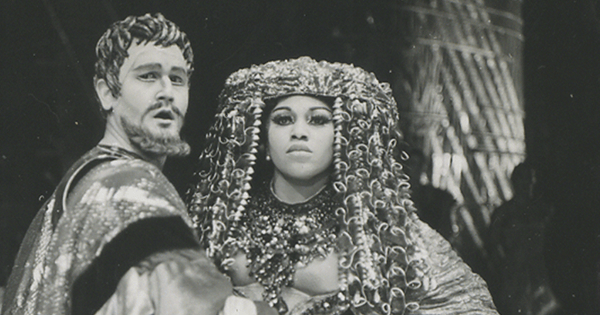
Fifty years ago, the new Metropolitan Opera House opened in New York City’s Lincoln Center. The search to replace the company’s storied yet outdated home on Broadway and 39th Street had gone on for decades, and opening night was much anticipated. To mark the occasion, the Met commissioned Samuel Barber to write a new opera. Barber was one of the most accomplished composers of his day—equally adept at orchestral and vocal music, his tonal, Romantic idiom favored by the notoriously conservative Met audiences, who had adored his previous opera, Vanessa. For this work, Barber considered and rejected many potential texts before settling upon his favorite Shakespeare play, Antony and Cleopatra. Leontyne Price, who by the mid-1960s had soared to international stardom, would sing the role of Cleopatra, and Justino Díaz, a prominent young bass, would take on Antony. Thomas Schippers, one of Barber’s many champions, was hired to conduct.
But there was trouble almost from the start. Barber imagined an intimate piece highlighting the conflict between politics and passion, a work that reveled, above all, in Shakespeare’s intense and febrile poetry. Franco Zeffirelli, however, charged with directing, producing, and co-writing the libretto, wanted something far grander and more elaborate—“mammoth sets, a vast cast, and sumptuous costumes,” as he later wrote, something akin to Verdi’s Aïda, lush and over the top. He happily made use of all the technological capabilities of the new opera house, with no expense spared. “Zeffirelli wanted horses and goats and 200 soldiers, which he got,” Barber later lamented, “and he wanted elephants, which fortunately he didn’t get.” That the spectacle of Zeffirelli’s imagining had little to do with the score Barber composed did not deter the director in the least.
On opening night, September 16, 1966, nearly 4,000 people, many celebrities and dignitaries among them, showed up to see a technical and logistical failure, with major problems affecting lighting and the revolving stage and the lack of rehearsal time for so extravagant an undertaking evident throughout the performance. At one point, Price got locked inside a massive pyramid and had no choice but to keep singing from within. It was, in the end, one of the most spectacular flops in the history of opera. The critics savaged both the production, which they viewed as crass, and Barber’s score, which seemed to lack a sense of drama and drive, as well as the lyricism typically associated with the composer. Barber would later substantially revise the work with his partner, Gian Carlo Menotti, yet Antony and Cleopatra has never made it into the repertory—a shame, given how much wondrous music it contains.
The morning after the disastrous premiere, Barber departed for Europe aboard the SS Constitution. He wasn’t fleeing from embarrassment—he had planned the trip for some time. And yet, he could have been forgiven for making a hasty escape. Just days before, after the dress rehearsal had concluded, Barber said to his cousin Katharine Fryer: “I’m not going to write any more music—I’m through.” Though the prophecy turned out to be untrue, he left American shores a thoroughly beaten man. The new opera house, however, was a hit.

